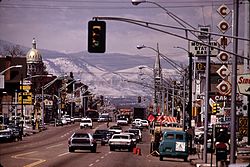Spring Colloquium: "'Preserving Our Way of Life': Annexation, Political Power, and the Color Line in Greater Denver, 1962-1974."
Event

Please join us for the 2015 Urban Studies Graduate Student-Faculty Colloquium Series, in the Urban Studies Office: 130 McNeil Building, 3718 Locust Walk. The series provides an opportunity for graduate students who are affiliated with the Urban Studies Certificate program to come together in a workshop format. Breakfast included!
Author: Rachel Guberman, Penn PhD Candidate in History
Abstract: In the 1960s and seventies, amidst dramatic growth and a reshuffling of political power within Colorado, residents of metropolitan Denver engaged in a protracted debate over the future of their metropolis. Municipal annexation and school desegregation were two crucial, interlinked arenas in which these struggles played out. City leaders often made the none-too-subtle suggestion that the suburbs “owed” Denver for making their racial exclusivity possible. Meanwhile, the Supreme Court’s 1973 ruling in Denver’s school desegregation case ultimately persuaded a majority of suburbanites to vote for an end to future Denver annexations in order to protect their children from the possibility of busing. Black and Hispanic residents, meanwhile, mostly urban, asserted their own claims both to the landscape and to a share of public goods. Ultimately, the triumph of a racialized, suburban vision for the metropolitan future contributed to a larger project of naturalizing political boundaries. In the process, it enabled white Coloradans from diverse ideological perspectives to coalesce around an individualist, consumerist, and ostensibly race-neutral political language while forcing blacks and Hispanics to adopt a similar vocabulary in pressing their own agendas.
